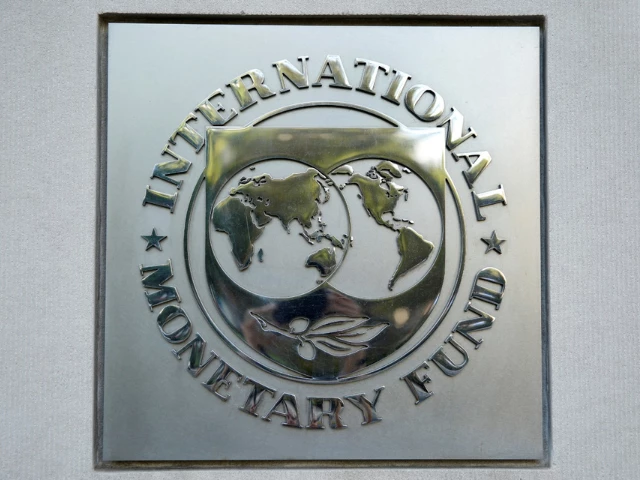'IMF conditions part of reforms'
Ministry clarifies 11 new benchmarks are logical extensions under $7b MEFP

Pakistan said on Monday that 11 new structural benchmarks by the International Monetary Fund (IMF) were not new conditions but a "continuation" and "natural next step" of the $7 billion programme to roll out the agreed reforms agenda.
It said that some of these benchmarks, including a requirement to submit a plan for the smooth transition to an interest-free economy and debt servicing surcharge, had to be included due to developments that took place after the finalisation of the Memorandum for Economic and Financial Policies (MEFP) with the IMF in September last year.
In a detailed statement on the rationale behind adding "new structural benchmarks" by the IMF, the Ministry of Finance said these were advancing or continuing actions under the broad policy goals set at the outset of the programme.
The ministry said that actions already completed were moving to the next phase, while others were updated or reiterated to ensure that policy goals under the programme were met.
On the IMF condition to publish a new Post-2027 Financial Sector Strategy, the ministry said that, "This benchmark was set in light of the 26th constitutional amendment passed in October 2024. Since the amendment took place after MEFP approval, the action could not be included in the September 2024 MEFP." It added that the action aligned the reform process with the country's constitutional priorities.
In return for the Jamiat Ulema-e-Islam's support for the 26th Constitutional amendment, the government had included an article in the Constitution to abolish the interest-based economic system.
The IMF staff report stated that clarity on the structure and rules of the financial system post-2027 would allow market participants to prepare and ensure financial stability during the transition.
The Fund said Pakistan's strategy should clearly identify and prepare for the implications of removing 'riba' (interest) from the economy by January 2028, following the constitutional amendment. The decision would significantly impact the structure of the financial sector, stability, banking supervision, and monetary policy implementation.
The global lender said that publishing this financial plan and providing guidance would help align expectations of market participants, investors, and regulators, allow time for preparation, and mitigate any cliff effect (proposed new SB, end-June 2026).
The IMF report further stated that the government should develop a strategic action plan to support capital market development to address the sovereign-bank nexus, and improve access to private sector financing.
In response to the IMF's concerns, the Fund included the government's position in last week's report.
"We recognise that clarity on financial sector reform objectives helps build trust in institutions and policies, and thus the Ministry of Finance will lead a government effort which, in collaboration with the State Bank of Pakistan (SBP), will prepare a plan outlining the government's post-2027 financial sector strategy, outlining the institutional and regulatory environment from 2028 onwards and providing clear expectations for financial institutions (new end-June 2026 SB), with work starting by end-October 2025," reads the report.
The ministry said that the structural benchmark to approve the fiscal year 2026 budget in consultation with the IMF was not a new condition. It was a continuation of ongoing fiscal consolidation targets, including the primary surplus target of 1.7% of GDP for fiscal year 2026.
It added that steps related to agricultural income taxation, including legal amendments and implementation from July 1, 2025, were detailed in the September 2024 MEFP. These were not new, but scheduled follow-up actions.
The ministry said the increase in Benazir Income Support Programme (BISP)transfer under the Kafalat Programme predated the current Extended Fund Facility (EFF). It was part of the 2023 programme and continued under the current programme, hence not a new conditionality.
On the new IMF benchmark about Governance Diagnostic Assessment, the ministry said the commitment to publish governance reform recommendations stemmed from the September 2024 MEFP and the publication was a natural next step.
The structural benchmark to adopt legislation making the captive power levy permanent operationalised an agreed reform in the September 2024 MEFP to disincentivise captive power, with the objective of phasing it out.
The ministry said benchmarks about electricity tariff and gas price adjustments related to annual electricity rebasing and biannual gas tariff adjustment, which were part of the strategy to contain circular debt. These were continuous benchmarks reiterated for the next fiscal year.
The ministry added that the new benchmark about the Debt Service Surcharge Cap Removal resulted from the government's plan to convert up to 80% of Central Power Purchasing Agency (CPPA) arrears into debt. As this plan was proposed after the September 2024 MEFP, the benchmark was added during the current review.
On the Special Zones Incentives phase-out plan, the ministry said that eliminating incentives for Special Technology Zones (STZs) by 2035 extended earlier commitments for Special Economic Zones (SEZs) and Export Processing Zones (EPZs). It broadened the scope to all zones to ensure a level playing field for investment.
It said the condition about used car import policy was part of lifting quantitative restrictions on commercial importation of used motor vehicles. Restrictions would initially be lifted for vehicles less than five years old, subject to meeting minimum environmental and safety standards. This, too, was a next step under the September 2024 MEFP.
The ministry said removing trade restrictions was part of Pakistan's commitment to integrate with world trade by reducing non-tariff barriers and avoiding prolonged trade-distortive measures.
"The EFF programme is designed to support gradual, medium-term reforms to achieve the government's policy goals. As each review builds upon the previous one, benchmarks reflect logical progression of existing commitments," it added.



















COMMENTS
Comments are moderated and generally will be posted if they are on-topic and not abusive.
For more information, please see our Comments FAQ